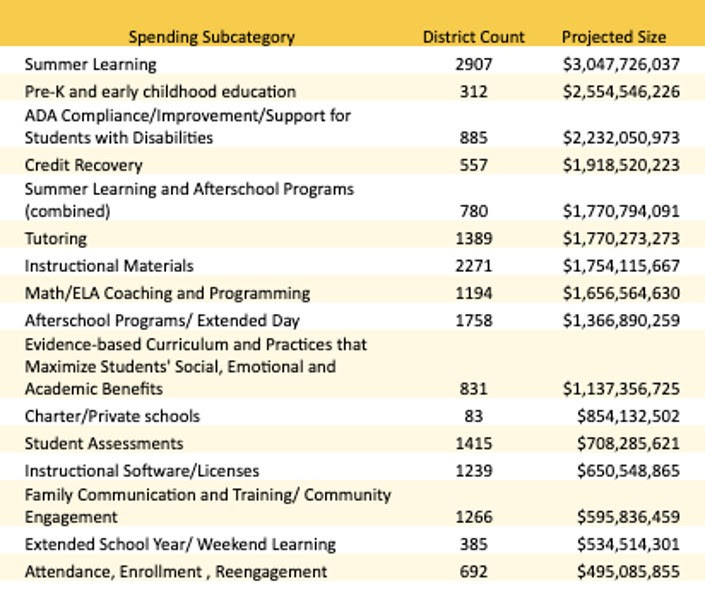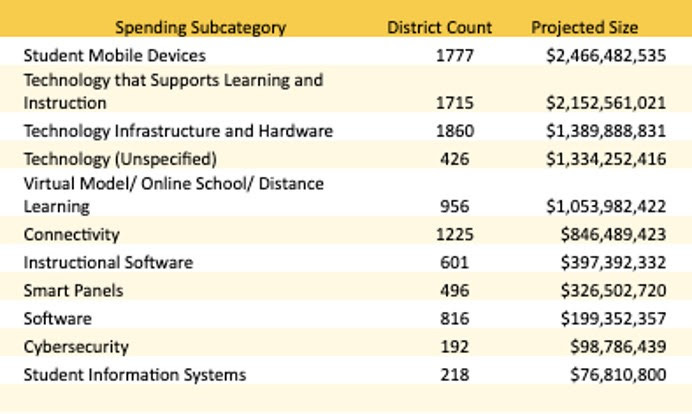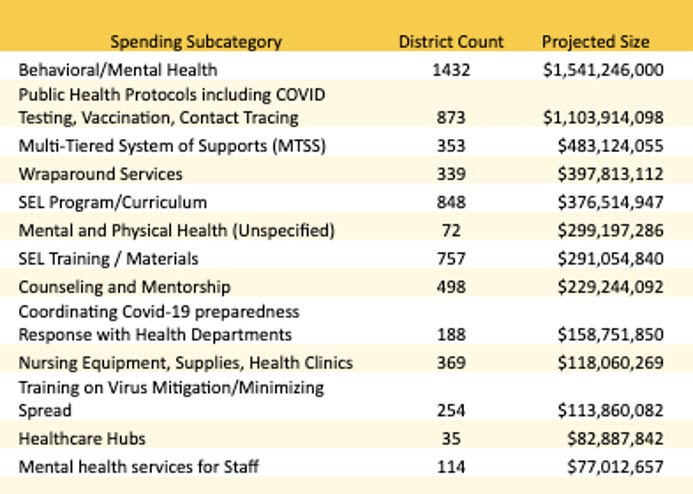Greetings from Aspen Ideas: Health! I’m looking forward to the discussion over the next few days, including some sessions reflecting on Covid and also youth mental health.
And just a reminder of our happy hour next Tuesday, June 27, 5:30-7:30 pm at Yardbird DC. Some great snacks including Chicken and biscuits, tomato and Mozzarella, crab cakes, and Yardbird’s famous mac & cheese. Some desserts as well.
No cost! Just bring yourself. And feel free to bring friends/colleagues. RSVP here.
Top Three
Math and Reading Scores for 13-year-olds Plunge to Lowest Levels Since the 70s: Via NCES, The 74, Chalkbeat, the AP, and K12 Dive. Sec. Cardona Statement.
“The ‘green shoots’ of academic recovery that we had hoped to see have not materialized,” Carr said in a statement.
The percentage of students missing 5 or more days of school monthly has doubled since 2020.
In 2023, fourteen percent of students reported reading for fun almost every day. This percentage was 3 percentage points lower than 2020, and 13 percentage points lower than 2012. Overall, the percentage of 13-year-old students who reported reading for fun almost every day was lower in 2023 than in all previous assessment years.
Smaller percentage of students report taking algebra compared to a decade ago, but no change from 2020.
The 74: "COVID-19’s cataclysmic impact on K–12 education, coming on the heels of a decade of stagnation in schools, has yielded a lost generation of growth for adolescents, new federal data reveal."
"The gaps in reading and math scores between white and African American students, totalling 23 and 29 points in 2012, grew to 27 and 42 points in 2023. The math gap between white and Hispanic students also grew, from 22 points to 28 points, over the same interval, though the literacy gap between those two groups shrank by four points."
Since the pandemic, students have learned at a slower rate than usual, creating a gap compared to their expected trajectory, dubbed by many as “learning loss.”
This learning loss has applied across student groups, states, and school types — but in general, historically disadvantaged students have fallen further behind.
Students in schools that spent more time in remote learning typically have lost more ground. It’s not clear what other factors explain why some schools have done better or worse, though.
COVID-19 Vaccines Protective in Children Ages 0 to 11: CIDRAP on a new study.
"Children under the age of 12 are protected against severe illness from COVID-19 by mRNA vaccines, but the effectiveness decreases over time, as does immunity gained from previous infections."
"By the end of the study, 584,707 children 5 to 11 years of age who were unvaccinated had 116,108 SARS-CoV-2 infections, 141 of which resulted in hospital admission and 5 of which resulted in death. Among the 302,486 children 5 to 11 years of age who were vaccinated, there were 42,484 SARS-CoV-2 infections, 52 of which were known to result in hospital admission and only 1 of which resulted in death."
"Overall, for children ages 5 to 11, the effectiveness of a primary mRNA vaccination series against infection, compared with being unvaccinated, was 59.9% (95% confidence interval [CI] 58.5 to 61.2) at 1 month, 33.7% (32.6 to 34.8) at 4 months, and 14.9% (95% CI 12.3 to 17.5) at 10 months after the first dose."
"The effectiveness of a previous Omicron infection against reinfection was 79.9% (78.8 to 80.9) after 3 months and 53.9% (52.3 to 55.5) after 6 months."
"For children ages 5 to 11, compared with primary vaccination only, the effectiveness of a monovalent booster dose after 1 month was 24.4% (14.4 to 33.2) and that of a bivalent booster dose was 76.7% (45.7 to 90.0). The effectiveness of Omicron infection against reinfection was 79.9% (78.8 to 80.9) after 3 months and 53.9% (52.3 to 55.5) after 6 months."
Teacher Well-Being and Intentions to Leave: Findings from RAND's 2023 State of the American Teacher Survey.
Teachers reported better well-being in January 2023 than in 2021 and 2022, and rates of job-related stress have returned to pre-pandemic levels.
23% of teachers said that they were likely to leave their job by the end of the 2022–2023 school year.
Among the 77% of teachers who were unlikely to leave their job by the end of the 2022–2023 school year, their ability to positively affect students and positive relationships with students and other teachers were the top reasons they intended to stay.
25% of teachers reported that their school or district directed them to limit discussions about political and social issues in class; 65% decided on their own to limit such discussion.
State
California: 'Fiscal cliff' approaching for some districts in California as costs soar and enrollment falls.
Iowa: Governor Reynolds has announced a change in leadership at the Department of Education, appointing McKenzie Snow, presently Deputy Secretary of Education in the Commonwealth of Virginia, to replace Chad Aldis as department director. Congrats McKenzie!
Kentucky: One central Kentucky school district is considering bringing back remote learning. Bourbon County Schools says it can’t compete with Fayette County’s new teacher salaries. Last month, the district approved a budget to start new teacher salaries above $50,000—the highest in the state.
Tennessee: Via David Mansouri in The 74: "With a New Ed Commissioner, Tennessee Looks to Next Phase in School Innovation."
Economic Recovery
Immigration Policy Is Innovation Policy: Via EIG: How Immigrants Fuel American Dynamism.
The Great Resignation Continues: Via Reuters:
A quarter of workers surveyed by PwC expect to change jobs in the next 12 months, up from 19% last year, as they are increasingly left cash-strapped in a cooling economy while dealing with inflationary pressures.
Even as the 'Great Resignation' continues, around 42% of the employees surveyed by PwC in its new study of the global workforce said they are planning to demand pay rises to cope with the higher cost of living, up from 35% last year."
Resources
Eating Disorder Rates Climbed During Pandemic Among UK Teen Girls: CIDRAP on a new study.
How to Close the Digital Divide in Affordable Rental Communities: Via Pew.
The Reading Revolution: How States are Scaling Literacy Reform: Via FutureEd in a new report and state scan.
Preparing for a Transition to a Through-Year Assessment System: Toolkit for State Leaders from EdFirst. And The Role of High-Quality Curriculum in State Assessment Design.
After Historic Declines in Math Scores, Schools Look to Bolster Summer Programs to Help Kids Catch Up: Via The 74.
COVID Isn’t Over for America’s Classrooms—Especially in STEM Learning. But We Can Fix That: Via Fast Company.
Former Secretary of Education Arne Duncan Will Chair the Board of Directors of The Hunt Institute: Via The 74.
Can America’s Students Recover What They Lost During the Pandemic?:Via ProPublica.
Burbio's ESSER III Summary: Via Burbio:
AI:
WEF: Adopting AI Responsibly:Guidelines for Procurement of AISolutions by the Private Sector
Some personal news: Trustible Announces Prestigious Appointments to its Advisory Board
Great thread by Larry Summers. "As that becomes more and more a commodity, that can be replicated with data and analysis, we are going to head into a world that is going to be defined much more by EQ than IQ and that is going to be a very different place."
Microsoft AI Introduces Orca: A 13-Billion Parameter Model that Learns to Imitate the Reasoning Process of LFMs (Large Foundation Models)
Meta: Introducing Voicebox: The Most Versatile AI for Speech Generation.
VentureBeat: Schools Should Teach AI To Every Child, According To Andrew Ng And Andrea Pasinetti
"OpenAI—an early mover in releasing chatbots powered by large-language models—is contemplating another initiative to extend its influence in the world of artificial intelligence. The company is considering launching a marketplace in which customers could sell AI models they customize for their own needs to other businesses, according to people with knowledge of discussions at the company."
The President meets with AI Executives in Silicon Valley including Center for Humane Technology Co-founder and Executive Director Tristan Harris, Common Sense Media Founder and CEO Jim Steyer, Algorithmic Justice League Founder Joy Buolamwin and Khan Academy Founder and CEO Sal Khan.
Adam Thierer: The Most Important Principle for AI Regulation:
"We need to reset the debate over AI and work toward common-sense policies that are not rooted in fear of the future."
" A recent report from the Center for Data Innovation summarizes this principle: “Regulate performance, not process.”
Majority Leader Schumer Delivers Remarks To Launch SAFE Innovation Framework For Artificial Intelligence.
EU: "MEPs ready to negotiate first-ever rules for safe and transparent AI"
Stanford HAI: Do Foundation Model Providers Comply with the Draft EU AI Act?
Seven Masterpieces to Celebrate Juneteenth: Via the WSJ.
Incredible: MLS fan pulls off incredible football feat during half-time challenge.
Surfs Up: Baby seal climbs onto surfer's board in San Diego.
Unbearable: Mama bear and baby bears playing on a golf course.








